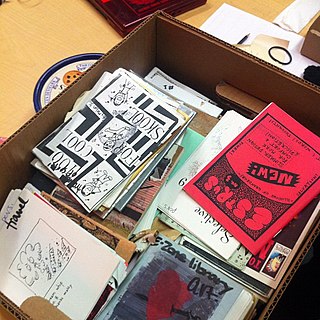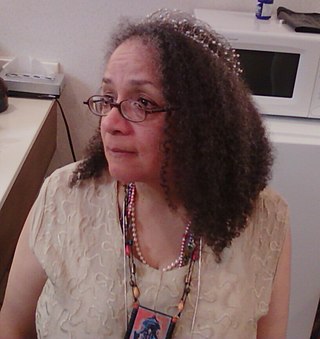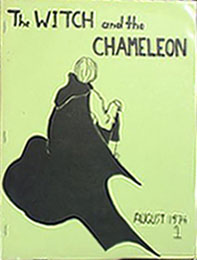Feminist science fiction is a subgenre of science fiction focused on such feminist themes as: gender inequality, sexuality, race, economics, reproduction, and environment. Feminist SF is political because of its tendency to critique the dominant culture. Some of the most notable feminist science fiction works have illustrated these themes using utopias to explore a society in which gender differences or gender power imbalances do not exist, or dystopias to explore worlds in which gender inequalities are intensified, thus asserting a need for feminist work to continue.
Science fiction and fantasy serve as important vehicles for feminist thought, particularly as bridges between theory and practice. No other genres so actively invite representations of the ultimate goals of feminism: worlds free of sexism, worlds in which women's contributions are recognized and valued, worlds that explore the diversity of women's desire and sexuality, and worlds that move beyond gender.

Joanna Russ was an American writer, academic and feminist. She is the author of a number of works of science fiction, fantasy and feminist literary criticism such as How to Suppress Women's Writing, as well as a contemporary novel, On Strike Against God, and one children's book, Kittatinny. She is best known for The Female Man, a novel combining utopian fiction and satire, and the story "When It Changed".
The Otherwise Award, originally known as the James Tiptree Jr. Award, is an American annual literary prize for works of science fiction or fantasy that expand or explore one's understanding of gender. It was initiated in February 1991 by science fiction authors Pat Murphy and Karen Joy Fowler, subsequent to a discussion at WisCon.

Science fiction fandom or SF fandom is a community or fandom of people interested in science fiction in contact with one another based upon that interest. SF fandom has a life of its own, but not much in the way of formal organization.

A zine is a small-circulation self-published work of original or appropriated texts and images, usually reproduced via a copy machine. Zines are the product of either a single person or of a very small group, and are popularly photocopied into physical prints for circulation. A fanzine is a non-professional and non-official publication produced by enthusiasts of a particular cultural phenomenon for the pleasure of others who share their interest. The term was coined in an October 1940 science fiction fanzine by Russ Chauvenet and popularized within science fiction fandom, entering the Oxford English Dictionary in 1949.

A science-fiction fanzine is an amateur or semi-professional magazine published by members of science-fiction fandom, from the 1930s to the present day. They were one of the earliest forms of fanzine, within one of which the term "fanzine" was coined, and at one time constituted the primary type of science-fictional fannish activity ("fanac").
WisCon or Wiscon, a Wisconsin science fiction convention, is the oldest, and often called the world's leading, feminist science fiction convention and conference. It was first held in Madison, Wisconsin in February 1977, after a group of fans attending the 1976 34th World Science Fiction Convention in Kansas City was inspired to organize a convention like WorldCon but with feminism as the dominant theme. The convention is held annually in May, during the four-day weekend of Memorial Day. Sponsored by the Society for the Furtherance and Study of Fantasy and Science Fiction, or (SF)³, WisCon gathers together fans, writers, editors, publishers, scholars, and artists to discuss science fiction and fantasy, with emphasis on issues of feminism, gender, race, and class.
Broad Universe is a United States-based, all volunteer organization with the primary goal of promoting science fiction, fantasy, and horror written by women. Writers, editors, publishers, reviewers, artists, and fans are invited to join them. "Broad-minded" men are welcome to participate. The organization originated in a panel discussion at WisCon, the feminist science fiction convention in Madison, Wisconsin, in 2000.

Avedon Carol is an American-born British feminist, anti-censorship, and civil liberties campaigner and a researcher in the field of sex crime, residing in England. She is a member of Feminists Against Censorship, and as part of their publishing group co-edited Bad Girls & Dirty Pictures (1993). She is the author of Nudes, Prudes and Attitudes (1994), and has also worked on other books by Feminists Against Censorship. On her own website, "Avedon's Sideshow", she publishes and compiles links to a wide array of stories and events.

Janus was a feminist science fiction fanzine edited by Janice Bogstad and Jeanne Gomoll in Madison, Wisconsin, and closely associated with that city's science fiction convention, WisCon. It was repeatedly nominated for the Hugo Award for Best Fanzine ; this led to accusations that if Janus had not been feminist, it wouldn't have been nominated. Eighteen issues were published under this name from 1975 to 1980; it was succeeded by Aurora SF.

Nisi Shawl is an African-American writer, editor, and journalist. They are best known as an author of science fiction and fantasy short stories who writes and teaches about how fantastic fiction might reflect real-world diversity of gender, sexual orientation, race, colonialism, physical ability, age, and other sociocultural factors.
Diversicon is an annual speculative fiction convention held in July or August in the Minneapolis-Saint Paul, Minnesota area. Diversicon provides programming and social opportunities to encourage the multicultural, multimedia exploration and celebration of SF by those within and outside of the traditional SF community. Diversicon includes both live and posthumous guests. It is sponsored by SF Minnesota.

Susan Joan Wood was a Canadian literary critic, professor, author and science fiction fan and editor. She was born in Ottawa, Ontario.
"When It Changed" is a science fiction short story by American writer Joanna Russ. It was first published in the anthology Again, Dangerous Visions.

The Witch and the Chameleon was a Canadian science fiction fanzine published 1974–1976 by Amanda Bankier in Hamilton, Ontario. It is generally recognized as the first explicitly feminist fanzine. It ran for five issues, the last being nominally a "double issue" numbered 5/6.
The role of women in speculative fiction has changed a great deal since the early to mid-20th century. There are several aspects to women's roles, including their participation as authors of speculative fiction and their role in science fiction fandom. Regarding authorship, in 1948, 10–15% of science fiction writers were female. Women's role in speculative fiction has grown since then, and in 1999, women comprised 36% of the Science Fiction and Fantasy Writers of America's professional members. Frankenstein (1818) by Mary Shelley has been called the first science fiction novel, although women wrote utopian novels even before that, with Margaret Cavendish publishing the first in the seventeenth century. Early published fantasy was written by and for any gender. However, speculative fiction, with science fiction in particular, has traditionally been viewed as a male-oriented genre.

The 72nd World Science Fiction Convention (Worldcon), also known as Loncon 3, was held on 14–18 August 2014 at the ExCeL London in London, United Kingdom.

Cheryl Morgan is a British science fiction critic and publisher. She has won Hugo Awards for her work on the fanzine Emerald City from 1995 to 2006, and as non-fiction editor of Clarkesworld magazine from 2009 to 2011. Morgan was the first openly trans person to win a Hugo Award, and she is currently the editor of the science fiction magazine Salon Futura.

To Write Like a Woman: Essays in Feminism and Science Fiction is a collection of essays by Joanna Russ, published in 1995. Many of the essays previously appeared as letters, in anthologies, or in journals such as Science Fiction Studies, Extrapolation, and Chrysalis. Topics range from the work of specific authors to major trends in feminism and science fiction. Through all of these different topics, Russ underlines the importance of celebrating the work of female authors and turning a critical eye on the commentaries and work produced by men.

Aurora: Beyond Equality is an anthology of feminist science fiction edited by Vonda N. McIntyre and Susan Janice Anderson and published in 1976.